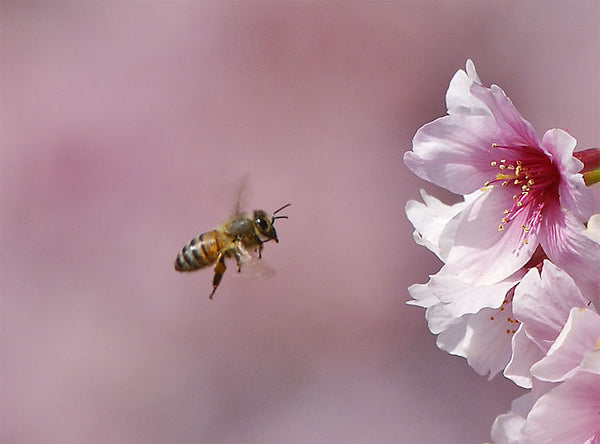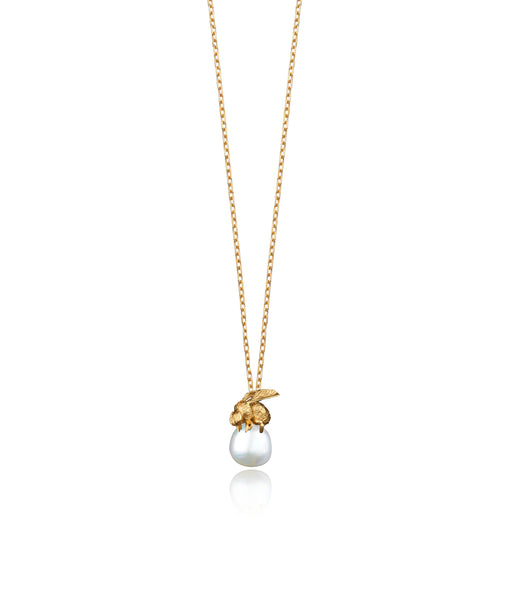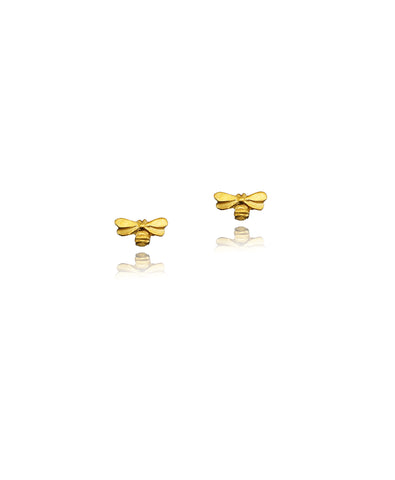Hooray! The bees are busily buzzing around Zoraida Jewellery HQ at the moment which can mean only one thing...Spring is here! With that in mind, we thought it would be timely to share our fondness for bees and how important they are and look at how we can help protect them.

One of our favourite charities - Friends of the Earth - are launching their ‘Bee Cause’ in May, to raise awareness about bee conservation and how we can all do our bit to help our little friends. As we feel it is a vital cause we will be donating 10% of all of our sales from our bee jewellery sold in May to Friends of the Earth.

Bees are so crucial to the natural world, but sadly their numbers are in decline. The last 15 years have seen colonies disappearing around the planet. In some parts of the world, the bee population has declined by 90%! In the UK 13 species of bee have become extinct since 1900 and another 35 species are under threat of extinction.
But bees play such an essential role in the ecosystem. They don’t just make delicious honey: by transferring pollen between male and female plants, they help them to grow and produce fruit and seeds. Without bees, our food chain would be seriously threatened.
As our bee inspired pieces are some of our biggest sellers - like these dinky little stud earrings - we know you guys feel the same way we do. So we thought we’d compile a short list of fun facts about bees and ways that we can all help to look after them.

Did you know…
- Honey bees visit 50 - 100 flowers every time they go out to collect pollen.
- They are the only insect that produces food eaten by humans.
- Honey is the only naturally occurring food that contains all the necessary substances for survival meaning we could live on honey alone.
- Bees fly up to six miles per journey at around 15 miles per hour.
- They beat their wings around 200 times a second! That’s why their buzz is so loud.
- There are over 270 species of bee in the UK.
- A hive of bees will travel 90,000 miles (that’s three times around the earth) to collect a kilo of honey.
Our favourite bee fact of all is that honey bees do a little dance to show their friends where there is a good food source. It’s called a “waggle dance!” When they get back to their hives, a bee will move in a figure of eight and waggle its behind in the direction of a good food supply. Which sounds a bit like twerking!
How can I help?
- Contact your council and encourage them to turn any green spaces into more bee-friendly habitats.
- You can make your own green space into a bee-friendly habitat by planting some of their favourite plants. These include things like various heathers, herbs and wildflowers. Bees also love Scabius and Catmint. Aim to grow a variety of plants that will flower throughout as much of the year as possible. This means the bees will have food on hand for longer periods. Also very handy is the Bee Saver which is a very useful guide and comes with a handy pack of wildflowers.
- If you have a garden, let a bit of it go wild. Not only does this mean less work for you but it’ll mean lots of potential food and living space for bees.
- Likewise, if you have a lawn...don’t mow it so often! Your back and the bees will thank you for it. When you do mow it, adjust the mower, so it doesn’t give such a severe cut.
- Eat organic. One of the biggest threats to the bee population is the use of harmful pesticides in farming.
- Eat local...especially local honey. Not only will this keep local beekeepers in business, and therefore help keep local bee numbers up, but eating honey produced where you live is very healthy, particularly if you suffer from hayfever.
- Don’t use pesticides in your garden and don’t be scared of a few weeds either. Bee’s love them!
- Leave cocktails out for bees, particularly around plants. By cocktails we mean: sugar mixed with water rather than mojitos and so on. Bees sometimes get a little bit ambitious in their pollen collecting missions and suddenly find themselves collapsing from exhaustion a long way from home. A little bit of sugar and water gives them the energy they need to get back to their hives. The RSPB recommend two tablespoons of sugar to one of water served in a shallow dish or similar.
- Create bee hotels for those species who don’t live in hives. We found an excellent guide here.
We hope you will have found some food for thought in the above. We certainly learnt a lot writing this post. The Scabious seeds are in the post, and we are mixing the cocktails to perfection. Shaken not stirred. It’s such an important issue to us, and we hope that if we can inspire even a few people to do something positive for bees, then that’ll “bee” a step in the right direction ; )


